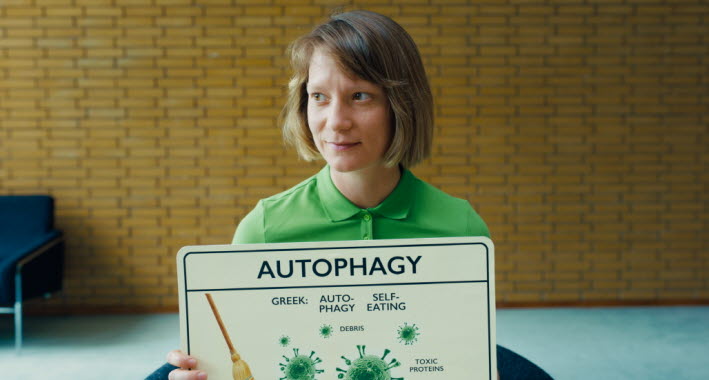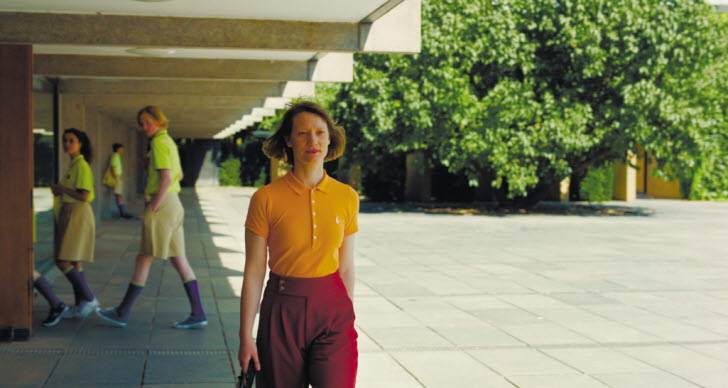Jessica Hausner’s new film “Club Zero” coldly unnerves us with a series of increasingly disturbing moments. While these very uncomfortable moments are presented with artistic precision and control, the movie merely feels distant and hollow in terms of story and characters, and that makes it all the more disappointing considering the committed efforts of its good cast members.
Mia Wasikowska, who has shown the more serious sides of her immense talent since her breakout turn in Tim Burton’s “Alice in Wonderland” (2010), played Miss Novak, a young teacher who has taught an unorthodox way of eating to a small group of students at some prestigious school. During the opening part, the students of her class tell about each own personal motive behind taking her class, and Miss Novak is eager to take all of them under her wing.
According to her rather weird belief, human beings actually do not need much eating once they focus more on “conscious eating”. As taught about her unorthodox eating method day by day, the students begin to practice on that step by step, and, what do you know, they soon find themselves eating much less than before. Even when they have more food than they need, they simply pretend to eat without actually eating them all, and it seems that Miss Novak’s odd teaching has some positive influence on all of them.
However, we gradually discern the disturbing sides of Miss Novak’s supposedly positive influence on her students. Her teaching come to feel more like that of a radical health farm cult, and she even tells her students that they can actually live without eating at all. As usual, most of her students believe her teaching without any question, while some of them naturally begin to show more doubt and skepticism before eventually quitting her class later.
Miss Novak would be stopped or fired at any sensible school, but she is allowed to continue her teaching just because her students have no problem with her at all on the surface. As a matter of fact, she is actually known quite well as an alternative nutritionist outside the school, and there is even a tea merchandise based on her unconventional teaching. The principal, who is played by Sidse Babett Knudsen, also has no problem with Miss Novak besides enjoying that tea merchandise given by Miss Novak, and the parents of the students, most of whom are rather distant to their kids, do not mind either just because their kids become less troublesome than before.
Of course, things subsequently become quite alarming as Miss Novak starts to take her unorthodox teaching to the more extreme levels, which are wholeheartedly accepted by her students without any question. Around that point, their belief and behaviors consequently draw more attention and concern than before, and even the principal comes to see later that something must be done about Miss Novak and her students.
While frequently baffling and disturbing us more and more with its clinical presentation of the madness of Miss Novak and her students, the movie makes some point about how her students are often susceptible to Miss Novak’s increasingly toxic influence. Most of them grow up in fairly affluent environment, but they are unhappy and vulnerable in one way or another as often feeling detached from their respective parents, and, mainly thanks to the convincing acting of the young cast members of the film, you may get some understanding on how people can be thrown under the spell of deceptive cult leaders like Miss Novak.
However, the screenplay by Hausner and her co-writer Géraldine Bajard does not delve much into what actually makes Miss Novak tick. As a matter of fact, we never get to know that much about her even around the end of the story, except how desperately she clings onto her belief for some unknown reason. Wasikowska is excellent whenever her character gets the students under control with her seemingly gentle but ultimately creepy appearance, but the movie strictly does not allow her to show any inner life of her character for more understanding or horror for us.
As a result, we only come to observe the last act of the movie from distant without much care or attention, even though what happens during this part will make you feel quite sick for good reasons (The movie wisely puts the warning involved with eating disorder at the beginning and end, by the way). To be frank with you, I winced a lot as barely watching one of Miss Novak’s students demonstrating more of her, uh, willpower right in front of her shocked parents, and I sincerely hope that nobody dares to try that after watching the film.
Overall, “Club Zero” may interest you for its disturbing story promise, but it only comes to feel like a superficial sick joke without much substance to, shall we say, chew on. Like her previous films such as “Lourdes” (2009) and “Amour Fou” (2014), Hausner did a skillful job of maintaining the ice-cold visual sense of detachment on the screen via precise scene composition and color scheme, and that may grab your attention for a while, but the result only comes to fizzle in the end like “Little Joe” (2019), which also ultimately feels rather empty and pointless despite its initially intriguing horror story promise. While it is a well-made arthouse movie packed with considerable technical efforts, I remember more of how it made me very comfortable at times when I watched it yesterday, and, folks, my stomach still cringes even at this point.










